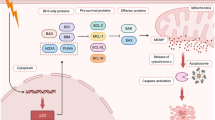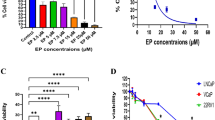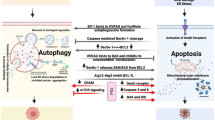Abstract
An important hallmark of cancer cells is acquired resistance toward apoptosis. The apoptotic pathway is the most well-defined cell death program and is characterized by several morphological and biochemical features. The tumor suppressor protein p53 is a critical regulator of apoptosis in many cell types. p53 stimulates a wide network of signals that act through either extrinsic or intrinsic pathways of apoptosis. However, a number of studies have shown that apoptosis can be induced in a p53-independent manner as well. In this study, we examined the mechanism of apoptosis in p53-null breast cancer cells in response to the proteasome inhibitor bortezomib. Initially, we determined the p53 status of 4T1 breast carcinoma and 4THMpc (a highly mestatic derivative of 4T1) cells and verified that both cells are p53 deficient. It was subsequently shown that apoptosis can be induced in both cells in a dose-dependent manner in response to bortezomib treatment, based on DNA fragmentation evidence. Western blot analyses of ubiquitin–protein conjugates additionally showed that the proteasome is potently inhibited by bortezomib in p53-null 4T1 and 4THMpc cells. The results presented in the current study also show that caspase-3 is significantly activated in response to the treatment with bortezomib, implying that induction of apoptosis in these p53-deficient cells is occuring via caspase-3. The additional results presented here suggest that the pro-apoptotic proteins Bad, Noxa, and Puma are not critical regulators of apoptosis induction in p53-null 4T1 and 4THMpc cells. Similarly, there was no difference in the expression level of Mcl-1 in treated cells, suggesting that this anti-apoptotic protein is also uninvolved in the apoptotic response resulting from bortezomib treatment. In contrast, a very significant upregulation of the anti-apoptotic protein Hsp25/27 was detected in these p53-deficient cells after treatment with bortezomib. If the increased expression of Hsp25/27 protein levels are muting the apoptotic effects of the bortezomib treatment, then the apoptosis-inducing effects of such proteasome inhibitors might be increased with approaches simultaneously inhibiting Hsp25/27 protein in p53-deficient cells.




Similar content being viewed by others
References
Blank M, Shiloh Y. Programs for cell death—apoptosis is only one way to go. Cell Cycle. 2007;6(6):686–95.
Melino G, Knight RA, Nicotera P. How many ways to die? How many different models of cell death? Cell Death Differ. 2005;12:1457–62.
Kerr JF, Wyllie AH, Currie AR. Apoptosis: a basic biological phenomenon with wide-ranging implications in tissue kinetics. Br J Cancer. 1972;26(4):239–57.
Haupt S, Berger M, Goldberg Z, Haupt Y. Apoptosis—the p53 network. J Cell Sci. 2003;116(20):4077–85.
Lopes UG, Erhardt P, Yao R, Cooper GM. p53-dependent induction of apoptosis by proteasome inhibitors. J Biol Chem. 1997;272(20):12893–6.
Maki CG, Huibregtse JM, Howley PM. In vivo ubiquitination and proteasome-mediated degradation of p53. Cancer Res. 1996;56(11):2649–54.
Saito A, Hayashi T, Okuno S, Nishi T, Chan PH. Modulation of p53 degradation via MDM2-mediated ubiquitylation and the ubiquitin-proteasome system during reperfusion after stroke: role of oxidative stress. J Cereb Blood Flow Metab. 2005;25(2):267–80.
Urist M, Tanaka T, Poyurovsky MV, Prives C. p73 induction after DNA damage is regulated by checkpoint kinases Chk1 and Chk2. Genes Dev. 2004;18(24):3041–54.
Rieber MS, Zangemeister-Wittke U, Rieber M. P53-independent induction of apoptosis in human melanoma cells by a bcl-2/bcl-xL bispecific antisense oligonucleotide. Clin Cancer Res. 2001;7(5):1446–51.
Fricker M, Papadia S, Hardingham GE, Tolkovsky AM. Implication of TAp73 in the p53-independent pathway of Puma induction and Puma-dependent apoptosis in primary cortical neurons. J Neurochem. 2010;114(3):772–83.
Jullig M, Zhang WV, Ferreira A, Stott NS. MG132 induced apoptosis is associated with p53-independent induction of pro-apoptotic Noxa and transcriptional activity of beta-catenin. Apoptosis. 2006;11(4):627–41.
Kim SG, Ravi G, Hoffmann C, Jung YJ, Kim M, Chen A, et al. p53-Independent induction of Fas and apoptosis in leukemic cells by an adenosine derivative, Cl-IB-MECA. Biochem Pharmacol. 2002;63(5):871–80.
Seol DW. p53-Independent up-regulation of a TRAIL receptor DR5 by proteasome inhibitors: a mechanism for proteasome inhibitor-enhanced TRAIL-induced apoptosis. Biochem Biophys Res Commun. 2011;416(1–2):222–5.
Pulaski BA, Ostrand-Rosenberg S. Mouse 4T1 breast tumor model. Curr Protoc Immunol. 2001; chapter 20: unit 20.2.
Erin N, Akdas Barkan G, Harms JF, Clawson GA. Vagotomy enhances experimental metastases of 4THMpc breast cancer cells and alters substance P level. Regul Pept. 2008;151(1–3):35–42.
Glinsky GV, Glinsky VV, Ivanova AB, Hueser CJ. Apoptosis and metastasis: increased apoptosis resistance of metastatic cancer cells is associated with the profound deficiency of apoptosis execution mechanisms. Cancer Lett. 1997;115(2):185–93.
Yerlikaya A, Erin N. Differential sensitivity of breast cancer and melanoma cells to proteasome inhibitor Velcade. Intl J Mol Med. 2008;22(6):817–23.
Pantazis P, Early JA, Mendoza JT, DeJesus AR, Giovanella BC. Cytotoxic efficacy of 9-nitrocamptothecin in the treatment of human malignant melanoma cells in vitro. Cancer Res. 1994;54(3):771–6.
Zou P, Kawada J, Pesnicak L, Cohen JI. Bortezomib induces apoptosis of Epstein–Barr virus (EBV)-transformed B cells and prolongs survival of mice inoculated with EBV-transformed B cells. J Virol. 2007;81(18):10029–36.
Mortenson MM, Schlieman MG, Virudachalam S, Bold RJ. Effects of the proteasome inhibitor bortezomib alone and in combination with chemotherapy in the A549 non-small-cell lung cancer cell line. Cancer Chemother Pharmacol. 2004;54(4):343–53.
MacLaren AP, Chapman RS, Wyllie AH, Watson CJ. p53-dependent apoptosis induced by proteasome inhibition in mammary epithelial cells. Cell Death Differ. 2001;8(3):210–8.
Lanni JS, Lowe SW, Licitra EJ, Liu JO, Jacks T. p53-independent apoptosis induced by paclitaxel through an indirect mechanism. Proc Natl Acad Sci USA. 1997;94(18):9679–83.
McNamee LM, Brodsky MH. p53-ındependent apoptosis limits DNA damage-ınduced aneuploidy. Genetics. 2009;182(2):423–35.
Pandit B, Gartel AL. Proteasome inhibitors induce p53-independent apoptosis in human cancer cells. Am J Pathol. 2011;178(1):355–60.
An WG, Hwang SG, Trepel JB, Blagosklonny MV. Protease inhibitor-induced apoptosis: accumulation of wt p53, p21WAF1/CIP1, and induction of apoptosis are independent markers of proteasome inhibition. Leukemia. 2000;14(7):1276–83.
Perez-Galan P, Roue G, Villamor N, Montserrat E, Campo E, Colomer D. The proteasome inhibitor bortezomib induces apoptosis in mantle-cell lymphoma through generation of ROS and Noxa activation independent of p53 status. Blood. 2006;107(1):257–64.
Ri M, Iida S, Ishida T, Ito A, Yano H, Inagaki A, et al. Bortezomib-induced apoptosis in mature T-cell lymphoma cells partially depends on upregulation of Noxa and functional repression of Mcl-1. Cancer Sci. 2009;100(2):341–8.
Rizzatti EG, Mora-Jensen H, Weniger MA, Gibellini F, Lee E, Daibata M, et al. Noxa mediates bortezomib induced apoptosis in both sensitive and intrinsically resistant mantle cell lymphoma cells and this effect is independent of constitutive activity of the AKT and NF-kappaB pathways. Leuk Lymphoma. 2008;49(4):798–808.
Poulaki V, Mitsiades CS, Kotoula V, Negri J, McMillin D, Miller JW, et al. The proteasome inhibitor bortezomib induces apoptosis in human retinoblastoma cell lines in vitro. Invest Ophthalmol Vis Sci. 2007;48(10):4706–19.
Yu J, Zhang L. PUMA, a potent killer with or without p53. Oncogene 2008; S71–83.
Combaret V, Boyault S, Iacono I, Brejon S, Rousseau R, Puisieux A. Effect of bortezomib on human neuroblastoma: analysis of molecular mechanisms involved in cytotoxicity. Mol Cancer. 2008;7:50.
Nencioni A, Hua F, Dillon CP, Yokoo R, Scheiermann C, Cardone MH, et al. Evidence for a protective role of Mcl-1 in proteasome inhibitor-induced apoptosis. Blood. 2005;105(8):3255–62.
Awasthi N, Wagner BJ. Upregulation of heat shock protein expression by proteasome inhibition: an antiapoptotic mechanism in the lens. Invest Ophthalmol Vis Sci. 2005;46(6):2082–91.
Bruey JM, Ducasse C, Bonniaud P, Ravagnan L, Susin SA, Diaz-Latoud C, et al. Hsp27 negatively regulates cell death by interacting with cytochrome c. Nat Cell Biol. 2000;2(9):645–52.
Acknowledgments
This study was funded by the Scientific and Technological Research Council of Turkey (TÜBİTAK) with Project no SBAG 109S035. We also would like to thank Dr. Bruce A. Stanley (Pennsylvania State University, College of Medicine) for critical reading and linguistic improvements.
Conflicts of interest
None
Author information
Authors and Affiliations
Corresponding author
Rights and permissions
About this article
Cite this article
Yerlikaya, A., Okur, E. & Ulukaya, E. The p53-independent induction of apoptosis in breast cancer cells in response to proteasome inhibitor bortezomib. Tumor Biol. 33, 1385–1392 (2012). https://doi.org/10.1007/s13277-012-0386-3
Received:
Accepted:
Published:
Issue Date:
DOI: https://doi.org/10.1007/s13277-012-0386-3




